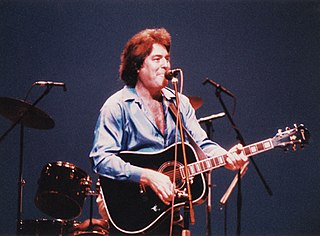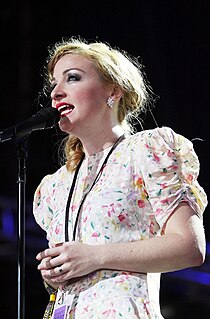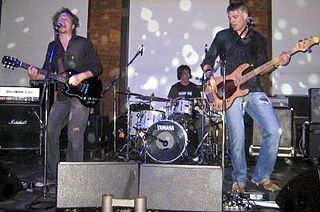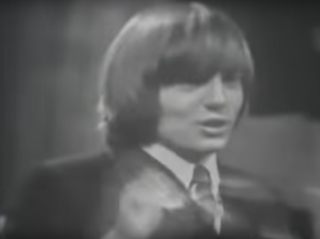Related Research Articles
Marty Kristian is a German-born, British-based musician. He grew up, and started his musical career, in Australia, as a solo artist. He is a singer-guitarist and, in the 1970s, he became a heartthrob as a founding member of the New Seekers.

John Inglis Young, OAM, known professionally as John Paul Young, is a Scottish-born Australian pop singer who had his 1978 worldwide hit with "Love Is in the Air". His career was boosted by regular appearances as a performer and guest host on national broadcaster, ABC's 1974–1987 TV series, Countdown. Besides "Love Is in the Air", Young had top ten chart success in Germany and the Netherlands with "Standing in the Rain" and four other top ten hits in South Africa, including No. 1 hits with "I Hate the Music" in 1976 and "Yesterday's Hero" in 1975.

Donald Richard Spencer, is an Australian children's television presenter, singer-songwriter, and guitarist. He had a long-running role on Play School on both the Australian version (1968–99) and the United Kingdom version (1972–88), one of only two presenters to work on both versions.

Patricia "Little Pattie" Thelma Thompson OAM is an Australian singer who performed as a teenage singer in 1960s surf pop and then in adult contemporary music. Her debut single from November 1963, "He's My Blonde Headed, Stompie Wompie, Real Gone Surfer Boy", achieved No. 2 chart success in Sydney and peaked at No. 19 on the national Kent Music Report. She appeared regularly on television variety programs, including Bandstand, and toured supporting Col Joye and the Joy Boys. Little Pattie was entertaining troops during the Vietnam War in Nui Dat, Vietnam, as an Australia Forces Sweetheart, when the nearby Battle of Long Tan began on 18 August 1966. In 1994 she received the Vietnam Logistic and Support Medal "in recognition of her services in support of the Australian Armed Forces in operations in Vietnam."
Leslie William Morrison, known professionally as Lucky Starr, is an Australian pioneer rock and roll, pop and country music singer, guitarist and television presenter. His most popular single, "I've Been Everywhere", appeared in early 1962, which peaked at number one in Sydney. Starr became well known through his many TV appearances on show's such as Bandstand and Six O'Clock Rock, in which he briefly hosted taking over from Johnny O'Keefe, he was the first star to entertain troops in Vietnam.
Albert Geoffrey McElhinney OAM, better known by his stage name Geoff Mack, was an Australian country singer, songwriter and aircraft mechanic. As a songwriter, he wrote the song "I've Been Everywhere" which was an Australian hit for Lucky Starr in April 1962 and became popular in North America when adapted for Hank Snow in November. More than 130 cover versions have been recorded.

Barry John Stanton was an English-Australian rock and roll musician. He performed on pop music programs, Six O'Clock Rock, Bandstand, Johnny O'Keefe Show, Sing Sing Sing, Saturday Date, and Woody's Teen Time. He issued a compilation album, A Tribute to the King Rare Songs 1957-1965, in 1988.

Kate Melinda Miller-Heidke is an Australian singer-songwriter and actress. Although classically trained, she has generally followed a career in alternative pop music. She signed to Sony Australia, Epic in the US and RCA in the UK, but since 2014 has been an independent artist. Four of her solo studio albums have peaked in the top 10 of the ARIA Albums Chart, Curiouser, Nightflight, O Vertigo! and Child in Reverse. Her most popular single, "The Last Day on Earth", reached No. 3 on the ARIA Singles Chart after being used in promos for TV soap, Neighbours, earlier in that year. At the ARIA Music Awards Miller-Heidke has been nominated 17 times.
"Wild One" or "Real Wild Child" is an Australian rock and roll song written by Johnny Greenan, Johnny O'Keefe, and Dave Owens. While most sources state that O'Keefe was directly involved in composing the song, this has been questioned by others. Sydney disc jockey Tony Withers was credited with helping to get radio airplay for the song but writer credits on subsequent versions often omit Withers, who later worked in the United Kingdom on pirate stations Radio Atlanta and, as Tony Windsor, on Radio London.

John Michael O'Keefe was an Australian rock and roll singer whose career began in the 1950s. Some of his hits include "Wild One" (1958), "Shout!" and "She's My Baby". In his twenty-year career, O'Keefe released over fifty singles, 50 EPs and 100 albums. O'Keefe was also a radio and television entertainer and presenter

Lonnie Lee is the stage name of David Laurence Rix, an Australian singer, who has fronted Lonnie Lee and the Leeman and Lonnie Lee and the Leedons. He is a pioneer of Australian rockabilly music and has worked in the industry for 60 years. At the peak of his career, Lee had eight top 100 singles, which included three top 20s, "Ain't It So", "Starlight Star Bright" and "I Found a New Love" (September). He achieved five gold records. His last single, "Sad Over Someone", was in 1969, and he continued to tour and perform into the 2000s.
The Vibrants were an Australian pop rock group that started as Bobby James and the Vibrants in Adelaide in 1962. James, their lead vocalist, left in 1965 to form the Bobby James Syndicate. As the Vibrants, two of their singles peaked in Go-Set Australian National Charts top 20: their cover versions of "Something About You Baby" and "My Prayer" (September). At the end of 1973the Vibrants disbanded.

Keir Francis Nuttall is a Brisbane-based guitarist-singer-songwriter. He is a founding mainstay member of the rock trio, Transport, which formed in 2001. He married Australian singer-songwriter and actor, Kate Miller-Heidke, in 2007. Since 2004 he has performed and recorded in her backing band. Nuttall's songs have been recorded by Miller-Heidke, including her singles, "Space They Cannot Touch", "Words" and other tracks on her debut album, Little Eve. As Franky Walnut, Nuttall performs comic songs such as, "Where Have I Been All Your Life?" and "Three Word Review", both of which he recorded. His first solo album, The Franky Walnut Reflective Drink Coaster (2013), was nominated for the ARIA Award for Best Comedy Release in 2014.
Ross D. Wyllie is an Australian pop music singer, television presenter and producer from the 1960s and 1970s. Wyllie had a top 20 hit with his cover of Ray Stevens' song "Funny Man" and an Australian No. 1 with "The Star", both in 1969. Originally from Brisbane, he hosted, Uptight, a weekly four-hour music series, on Channel 0 in Melbourne from 1967 to 1969. In 1970 he followed with a similar show, Happening '70, and from 1978 to 1980, he presented films on a late-night time slot.

The Delltones were an Australian rock 'n' roll band, which formed in 1958. They started as a doo-wop, harmony quartet with Warren Lucas, Brian Perkins, Noel Widerberg and Ian "Peewee" Wilson. In June 1962 Noel Widerberg died in a car accident in Brighton-le-Sands in Sydney, and three weeks later the group's single, "Get a Little Dirt on Your Hands", reached the top five on the local charts. Widerberg's position was filled by Col Loughnan. The group disbanded in 1973.

Shane Michael Howard is an Australian singer-songwriter and guitarist, he was the mainstay of folk rock group Goanna which had hit singles with "Solid Rock" and "Let the Franklin Flow" on the Kent Music Report and their album, Spirit of Place. After their disbandment he pursued a solo career.

Gene Pierson is a musician, who had an early solo career in New Zealand and then in Australia. His 1960s and early 1970s songs, "Love, Love, Love", "You Got to Me" and "Reach Out", achieved local chart success in Australia and New Zealand. He launched AC/DC at Chequers on New Year's Eve 1974 and later became a publisher and music producer in Australia.

Michael Alexander Furber was an English-born Australia entertainer popular in the mid-1960s as the lead singer of Mike Furber and the Bowery Boys. Furber's group had hits with "Just a Poor Boy", "You Stole My Love" and "That's When Happiness Began". In the Go Set Pop Poll, Furber was voted in the top 5 as most popular Male Vocalist in both 1966 and 1967. Furber's subsequent solo singing career was less successful and in the early 1970s he turned to stage musicals: including Godspell and Nuclear. According to police investigators Furber committed suicide on 10 May 1973, by hanging, in the garage of his home. Rock music historian, Ian McFarlane, writes, "Reputedly in the depths of depression, he hanged himself... It has been suggested, however, that Furber was actually murdered because he had befriended a Kings Cross prostitute."

Digby George "Dig" Richards was an Australian rock and roll singer, songwriter, instrumentalist, musical theatre actor and television presenter, active during the late 1950s and early 1960s as lead singer with the R'Jays. Richards was the first Australian rock and roll artist to record a 12" LP record in Australia, with the self-titled album Dig Richards, released in November 1959. From 1971 he performed as a solo country music artist. According to the Kent Music Report he had four Top 30 national hit singles, "(My) Little Lover" / "Quarrels ", "A Little Piece of Peace", "People Call Me Country" / "The Dancer", and "Do the Spunky Monkey". On 17 February 1983 Digby Richards died of pancreatic cancer, aged 42. He was survived by his wife, Sue and two children.
Raymond Hough, who performed as Ray Hoff, was an Australian rock 'n' roll and R&B singer from the late 1950s to mid-1970s. He led Ray Hoff & the Off Beats from 1959 to 1967, which issued a self-titled album. During the early 1970s he was a member of Perth-based blues revival group, Likefun. After his music career he became an auto detailer. In 2005 he was diagnosed with cancer, subsequently he had two strokes and died on 19 March 2010, aged 67.
References
- 1 2 "'Beautiful Sunday' at APRA search engine". Australasian Performing Right Association (APRA) | Australasian Mechanical Copyright Owners Society (AMCOS). Retrieved 6 March 2020. Note: For additional work user may have to select 'Search again' and then 'Enter a title:' &/or 'Performer:'
- ↑ Schluter, Kevin (26 May 1982). "You Wanted to Know". The Australian Women's Weekly . p. 152. Retrieved 6 March 2020– via Trove (National Library of Australia).
- ↑ Hurley, Jade (2003). Jade: The Jade Hurley Story. Jade Hurley Star Communications. ISBN 0646424629.
- 1 2 Nichols, David (2016). Dig: Australian Rock and Pop Music, 1960-85. Portland, OR: Verse Chorus Press. p. 34. ISBN 978-1-891241-61-1.
- ↑ Rogers, Bob (26 September 1965). "Bobbin Around". The Sydney Morning Herald . p. 81. Retrieved 17 July 2016.
- 1 2 Hayton, Jon; Isackson, Leon (2010). Behind the Rock and Beyond: the Diary of a Rock Band 1956–1980. Sid Harta Publications. p. 1944. ISBN 978-1-921642-28-9.
- 1 2 3 Spencer, Chris. Ed Nimmervoll (ed.). "Come Back Again... Jade Hurley: The Jade Hurley Story". HowlSpace – The Living History of Our Music. White Room Electronic Publishing. Archived from the original on 23 August 2006. Retrieved 7 March 2020– via National Library of Australia.
- ↑ "Jade Hurley – 'Battle of New Orleans'". 23 November 2012. Retrieved 17 July 2016– via YouTube.
- 1 2 3 Adams, Clay (2 December 1981). "The Golden Touch of Jade". The Australian Women's Weekly. p. 144. Retrieved 6 March 2020– via Trove (National Library of Australia).
- 1 2 3 4 5 Nuttall, Lyn. "'Gold and Silver' – Jade Hurley (1966)". Where did they get that song?. PopArchives – Sources of Australian Pop Records from the 50s, 60s and 70s (Lyn Nuttall). Archived from the original on 3 May 2017. Retrieved 13 June 2018.
- ↑ "Billboard Book – Google Books". 10 July 1965. Retrieved 30 September 2016.
- ↑ "Jade Hurley: Australia's rock-n-roll survivor" . Retrieved 17 July 2016.
- ↑ Hickey, Phil (31 October 2015). "Country Rock Star Jade Hurley Robbed of Merchandise While on Tour in Perth". Perth Now. Retrieved 11 November 2016.
- 1 2 Ironside, Robyn (25 March 2009). "Jade Hurley's Bling Stolen from Motorhome". The Courier-Mail. Retrieved 7 March 2020.
- ↑ Barbeler, David (21 April 2009). "Singer's $110k rings flogged for $150". news.com.au. Australian Associated Press (AAP). Retrieved 7 March 2020.
- ↑ "'Australia's King of Country Rock' Jade Hurley OAM" . Retrieved 23 March 2019.
- ↑ Kent, David (1993). Australian Chart Book 1970–1992 (illustrated ed.). St Ives, N.S.W.: Australian Chart Book. p. 145. ISBN 0-646-11917-6.
- ↑ "Award Extract – Name: Mr Jade Hurley". Department of the Prime Minister and Government. 8 June 1998. Retrieved 6 March 2020.
- ↑ "Mike Walsh Show, The" . Retrieved 17 July 2016.